Outsource, Save Time, and Make More Money
Running an ecommerce store means having to take care of many different aspects of the business.
But that doesn’t necessarily translate to doing it all on your own. As a business owner, as much as you’d like to have full control over all of your store’s operations, you must learn to prioritize what’s important.
That’s where outsourcing comes into play. Delegating parts of your business to others frees up your mind so you can dedicate more time, energy, and effort to what really makes your business grow.
In this episode of Start Yours, we’re changing things up a little and have for you a handful of experts to talk about the benefits of outsourcing, how to strategize it, and what you definitely should NOT be doing.
If you enjoy the show, remember to subscribe so you don’t miss out on upcoming episodes. Also, check out our past episodes and hop over to our blog for more information about launching an online business.
No time to listen to the podcast or read through the transcript? We’ve got you covered with this seven-point TL;DR version:
- Don’t be shy about reaching out to people who can help your business and make sure your onboarding sets them up to succeed.
- When outsourcing videography or video editing, choose someone who uses a good editing program as it’s a reflection of their professionalism.
- If you delegate tasks and do the things that you really enjoy, you don’t burn out as much.
- Outsourcing frees up thinking time for you to focus on things that help your business grow.
- The two types of jobs to outsource: jobs that won’t make your business a success no matter how well they’re done and those that should be done well but don’t have to be perfected.
- An advantage of outsourcing Instagram marketing is that there are many different stages of that content creation process you can outsource.
- Ripping off videos and ads from other stores and businesses is immoral, not a form of outsourcing, and should NEVER be done.
Start Yours is a podcast about ecommerce, dropshipping, and all things launching a business.
Join us as we meet entrepreneurs who have gone through the triumphs and headaches of running an online store, and learn how they managed to survive and thrive.



Part 1: Paul’s Two Cents on the Benefits of Outsourcing
Paul: So before I joined Shopify Plus, I used to be a Plus merchant myself, and during that time running the business, I used to really need to rely on outsourcing to really free up my time to focus on what’s really important and what I enjoy doing in the business, but also to remove myself as a bottleneck in the business.
→ Click Here to Launch Your Online Business with Shopify
So things that I found was that as we started to grow and the business and revenue was increasing, there were tasks that I would normally do that I had a hard time handing over. So whether that was posting on social media, or running Facebook ads, or whatever it might be, I started to have to give up control over certain things so that I could free myself up for more high-impact work.
So I guess a question you might need to ask yourself as a business owner is, “Am I the best person to do this job or is there someone out there that I could hire or I could bring in that’s able to do the job even better than I could and take it to a whole new level that’s gonna free me up to do the work that I am best at doing and that I really enjoy and that I can have the most impact on my customers?”
And so it’s always a little bit difficult to do that, but it’s a thought experiment that can really help when scaling up your business and outsourcing.
One other thing I wanted to touch on was this idea of global talent and being able to outsource parts of your business to people across the world.
So there are so many tools and platforms at the moment that you can use to find really talented people from across the world that can really help your business.
So yeah, really, don’t be shy to go out there and try to find people that can help you in your business, and really try to set them up for success.
So something that I used to do quite a lot was to record a video explaining, “Hey, here’s how I currently do this task in the business,” and then that would be something evergreen that the person that was coming to the team could then use. Or I would write down the steps in a Google document as well and share that with them.
So the name for that… What we used to call them was just “working procedure document”. So these are just systems, essentially, that allow you to step back, and then someone can come in and help to run those parts of your business for you.
We live in a knowledge economy of sorts so we don’t necessarily need to hire someone 40 hours a week.
It could be hiring someone for one to two hours a week to give you really good advice or to do something really impactful for your business. So try not to think about outsourcing in rigid terms, like 40-hour workweeks can really help to find talented people that can help take your business to the next level.
An example of that might be hiring someone to do Facebook ads. Maybe you could hire one person who is really good at the strategy to only do about an hour’s work a week, and then maybe you’ll hire someone else to manage the hands-on day-to-day stuff, and that might be 10 to 15 hours a week. So just something to think about when you’re outsourcing for your business, and best of luck.
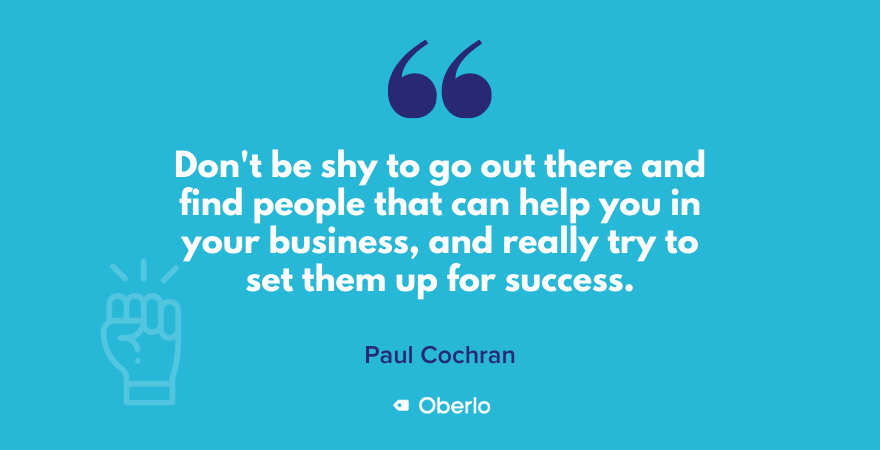
Aleisha: I just wanted to add on to Paul’s suggestion of doing screen-shares when you are training someone that is freelancing or is outsourcing a task for you. It can really help when you are going through that task and you’re screen-sharing and realizing that perhaps the way that you’ve been doing the task isn’t necessarily the most efficient way to do it.
For example, I worked with a virtual assistant all last year, and I went through and I showed her how I would go into my WordPress blog and I would do the posts and then I would come in and create images in Canva to then drop them in.
And after a while, she said to me, “Aleisha, would you be offended if I change this up a little bit? Are you really stuck in the way that you’re doing it, or can I go rogue?”
And the beautiful thing about that is when she came back, and she screen-shared what she did differently, I realized that I’d been wasting a bunch of time on the processes and systems in place that I had, when actually when you get another set of eyes in and they look at what you’re doing, it can really change the game.
Part 2: Kristian Talks About Outsourcing Videography on a Budget
In episode 23 of Start Yours, you may have heard David speaking to photographer Ben Waugh all about how to create the ideal at-home photography set up. But if you’re looking to up your game or perhaps add videos to your store, and that could be a product explainer video, one of those animated videos that a lot of people use, or even just a really sleek video of your product being used out in the real world, then one area to outsource could be videography and editing.
A lot of people underestimate the time and the skills that are required to put a video together.
And as you’ll hear, Kristian, who’s a senior creative producer here at Oberlo, he works with Jessica on our YouTube channel creating all those amazing videos, Kristian talks about what it takes to make something look really sleek, and also how to pace a video, especially for really short attention spans, which let’s face it, we all have.
I have to be honest that if something pops up on Facebook or Instagram, or if I’m on a store and it requires me to think too much, if you are not getting to the chorus immediately, I’m moving on. And gosh, if you are asking me to press the button that says, “Put the sound on,” and it’s not worth my while, that annoys me.
And yes, I do sound like a Gen Z in the body of a mid-30s woman, but that’s who I am. If I am your core customer and you are not entertaining me or informing me with the video and imagery that you’re putting on your store, then I’m probably not gonna make a purchase or I’m probably not gonna stick around long enough for you to convince me to do so.
So let’s hear some of Kristian’s tips about how you can make really good video content by outsourcing to people that know what they’re doing and also sticking to a pretty small budget.
What do you think about explainer videos? Do you think they are something we should be investing in for our stores or for our website?
Kristian: I think so, I think absolutely. There’s… Photos can only do so much with what you’re selling. I mean, obviously it may very much depend on what you’re selling. If you’re selling something that when you look at it it’s not immediately obvious what it does, or if it has multi-functions, show that in a video.
If you watch a video and you see someone using something, you can picture yourself more easily doing it, you can see why it’s got a benefit, why it’s got a value. And I think everything is video. Photography is great, and it’s a great way of showcasing something in a very static way.
But if your product isn’t just something that looks good but actually has a function, you need to showcase that in a video.
Aleisha: I suppose also when you’re investing in this sort of work, you could also repurpose the content, using that video on social media, you could use it as email examples as well. So you don’t have to think about it as one investment and one thing, you could spread it out across all your platforms.
Kristian: Yeah, completely. I think making one video isn’t making one video to sit in one location. That video will go out on email marketing, you can just resize it, you can put it on your social media, you can put it in your adverts, you can put it on your page, on your Facebook.
That video can sit anywhere, and you can, also, if you’re worried about it being repetitive or multiple people… Or the same person seeing that video, just doing slightly different edits, which again, your hired editor can do for you, will make it more interesting and will make the same person watch it twice without realizing.
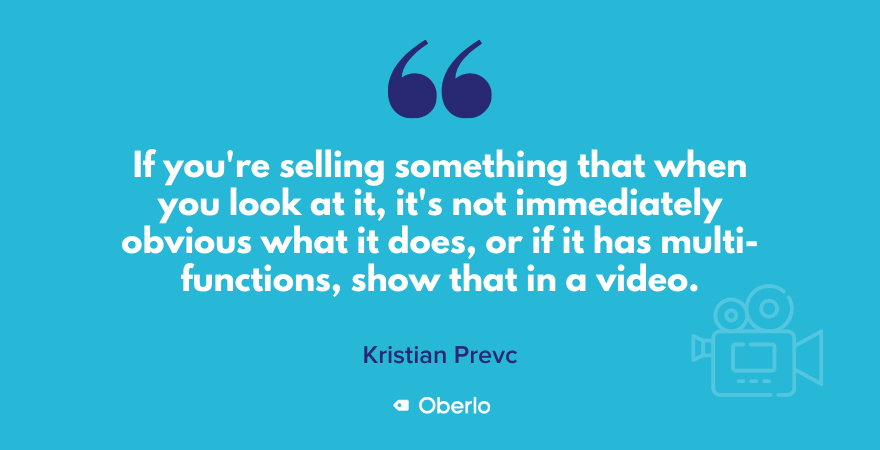
Aleisha: That’s really clever. And so you’re saying we look for freelance websites like Upwork, Fiverr, and what are we needing to ask people when we’re interviewing them and making sure they’re right for the job?
Kristian: If let’s say we’re asking an editor, I’d ask first and foremost have they done sort of quick edits before, ’cause I think you’re not looking for a long form here. You want something that’s gonna be able to explain what you’re doing and showcasing in sort of, well, depending on where you’re hosting the video, between 5, 15, 30 seconds.
So you want someone that can do quick form editing that’s snappy, that you know how to cut between the scenes without having to give too much narrative. You want someone that’s probably hopefully using a good program, so Premiere Pro, Final Cut. If they’re using them, then they’re more likely to be a much more serious and more professional editor.
And also ask to see a showreel, ask to see what work they’ve done before. You might not know a lot about video making, but you know what you like, and you know when you see something good.
If you see their work and you don’t like it, don’t go with it.
Aleisha: I think video is such an investment, and good photography as well. It can make or break a store. What about filming on your iPhone or your Android and then using an editor to put that footage together? Is that an option or is that just cutting a corner?
Kristian: I think that definitely is an option. I think having a video of any sort on your website is good. Having a better video is obviously better. You have access to an iPhone, they shoot pretty well now.
If you know where your platform is, if let’s say you’re filming for Instagram Stories, make sure you’re filming vertically. If you’re filming for YouTube ads, make sure you’re filming horizontally.
You just get the basics of those kinds of things right, and you set your camera to a decent setting to record in 4K or make sure it’s at least in 1080p, then you can definitely do that yourself, you can definitely do that yourself.
And having a video on your website is better than not having a video, even if you’ve made one yourself.
Aleisha: Let’s repeat that again, let’s turn the camera around. I don’t know how many times I see people taking the photos the other way up, and it’s like, “Oh my gosh, you’re never gonna be able to use this photo again. Turn it around so we get the full image.” Ugh, it’s so simple.
Kristian: And it can get quite frustrating when you see something you know has been shot the wrong way, and then you have to fill out the screen, you have kind of the blurred image… It doesn’t work.
Aleisha: Just stop, yeah.
Kristian: But I will say while hiring people and finding people to do work with you is really great if you’re planning on selling one or two items. If you’re thinking long term and you’re gonna be doing this for a while and you need to make a lot of videos, then it would be worth investing in a course or learning yourself how to shoot, and maybe to get some decent equipment because for a couple of times you can definitely… It’s worth the expense of hiring someone.
If you’re thinking about doing this consistently, learn yourself. It’s gonna cost you… Save you so much more money. And it’s enjoyable. Personally I really enjoy it.
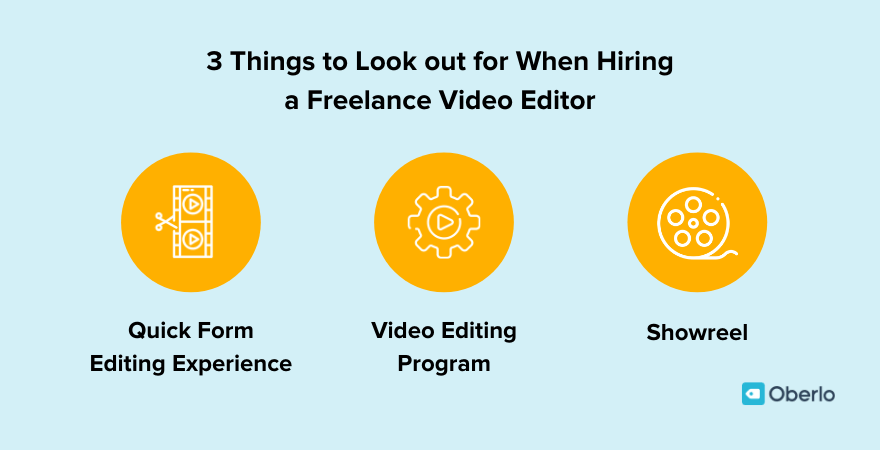
Part 3: Pro Dropshippers Provide Outsourcing Tips
Aleisha: Over the last three seasons of Start Yours, outsourcing has been a regular topic of conversation. And I thought I’d just bring you a couple of excerpts from previous interviews where David has asked guests their best tips for outsourcing and also avoiding burnout, which is a really big topic that I think should be discussed more in our community.
And a reminder from me, someone who has experienced burnout in the past, that you don’t have to do everything.
You don’t have to be a martyr. It feels really good to ask for help or to pay someone else to help you.
David: And what are the daily tasks? So would this fulfilling orders be part of the things, the replying to emails, that sort of stuff?
Paul: Yeah. So I basically categorized every single component of dropshipping from the customer service side, fulfillment side, Facebook advertising side. I literally outsource like to seven different things.
So to give you some examples, customer service; they handle all emails, all Facebook comments, deleting them, hiding them or whatever, customer order fulfilments, and a video editor.
And product researchers; I hired two of them, and I basically told them, “These are the kinda products I’m looking for. This is how you find them. You go on these sites, you do this specific method, then you swap with another method, and then you give me 20 products every single day in an Excel sheet.”
And basically I say, “Okay, ten of these products, I don’t like ten of these products, let’s go, let’s go and test them.” It’s completely outsourced.
David: When people talk about burnout, is this exactly what you were going through?
Emma: Yeah, when you wake up and go to work and you dread your job. If you start dreading it and you start feeling like, “I can’t do this anymore, and this just too much work to do,” sometimes that is burnout, that is a sign of burnout.
If you did hire people and things were delegated and you were doing the things that you enjoyed, then you don’t burn out as much.
Ryan: And that’s another big thing with delegating your tasks towards other people is that you wanna be the business owner, you don’t wanna work in your business.
And that’s another thing, a lot of mentors have told me is that being in the business, you’re not really able… You’re always working operationally, so you’re not able to actually think very strategically ’cause you’re always kind of putting out fires, “This needs to be done, this needs to be done.”
You can’t think about how to grow. And that’s one of the biggest things you need to do as a business owner is to understand how to actually grow the business. You need to have, literally, thinking time for that where you can put out, put two hours aside on the day where you do nothing but just think, write out and kinda strategize new ecommerce marketing plans, things that are going on, things that can help you grow.
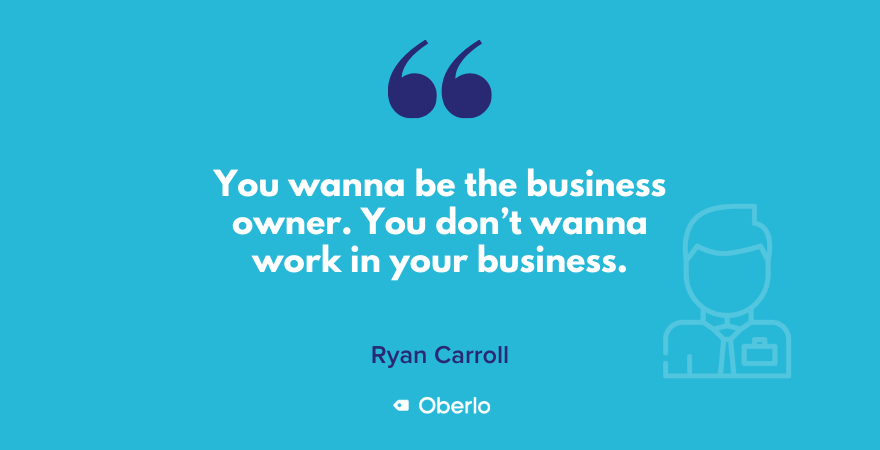
Aleisha: If you are enjoying today’s episode, then you are going to love visiting Oberlo.com which is the home to all of our blog posts, YouTube videos, and really helpful content if you are looking to start a business, improve your business, or get into the dropshipping scene.
In this second half of this episode of Start Yours about outsourcing and how you can outsource to make more money, I’m gonna catch up with my co-host, David. We’re looking at some of the skeezy tactics that some online marketers use to entice people to copy other people’s stores and really remove any originality and creativity when it comes to creating an online store, which actually works against you in the long run.
We’re also catching up with Jessica who heads up our Oberlo YouTube channel. She’s gonna talk about Instagram and how you can work with a freelancer to make sure you have fresh content all the time without the burden of having to come up with it every single day.
But now, let’s head to Tomas. He is the founder of Oberlo. He has run multiple businesses and really knows what he’s talking about. I have to say that, ’cause he’s my boss, but it’s true.
Part 4: Tomas Shares His Outsourcing Framework
Tomas: Hello everyone. Tomas here from Oberlo. Aleisha asked me what I would outsource if I was building my online store today. So, first, outsourcing is an expense.
If you are building your first online store, chances are you have more time than money. And it’s totally fine.
If you are in that spot, just focus on doing as much as you can yourself, and then the time will come. If you are past that stage and you have extra cash to find help, then here’s my advice. The way I like to look at it is that there are three types of jobs.
First, there are jobs that no matter how well you’re doing them, they won’t make your business a success. Think of all the boring mechanical tasks like taking information from a Word document and putting it in their Shopify admin, or just regular data entry tasks. What you want to do with them is to outsource as much as you can or find someone to do that for you.
The second type are jobs that if you do them poorly they might break your business. But it’s okay if you do them well enough. Take ecommerce store design as an example. So, if you have a terrible-looking store, you might scare away your potential customers. But it’s enough to have just the standard looking store and there are many great solutions off the shelf from the Shopify theme store, or you can get a great looking store working with Shopify partners.
So I wouldn’t invest too much time into that because that’s not what will make your business a success.
Another example is customer service. It’s very important that you stay close to your customers at the very beginning and reply to every single ticket yourself. However, over time, those questions become repetitive, and the value that you get out of replying to them yourself is diminishing. So what you would like to do is probably create standardized replies and outsource that work.
Now, the third type of jobs are jobs that will make your business a success. So, if you are creating your own product and selling it, and you believe your product is your competitive advantage, then that’s the type of job that we’re talking about, and here’s where you should be focusing all of your efforts and probably never outsource.
On the opposite side, if you are selling a product that everyone else is selling or a product that is similar to what others are selling, then your competitive advantage might be marketing which is how well you understand your audience, or where they hang around, or what they care about.
So, if you believe marketing could be your competitive advantage, then spend most of your time there and it’s probably a type of job that you would never outsource.
So here are three types of jobs. So jobs that no matter how well you do them they won’t make your business a success and these are the jobs that you want to outsource first. Then there are jobs that you want to ensure are done well but you don’t need to perfect them. And these are the jobs that you would outsource.
And then third, there are jobs that will actually make your business a success, whether that’s your unique product, or some sort of innovation in that field, or just your marketing and you would probably never want to outsource that job or you would want to get a partner who’s close to you to help you out.
So I hope that you will find this framework of jobs helpful. And thanks for the opportunity to share that with you today.
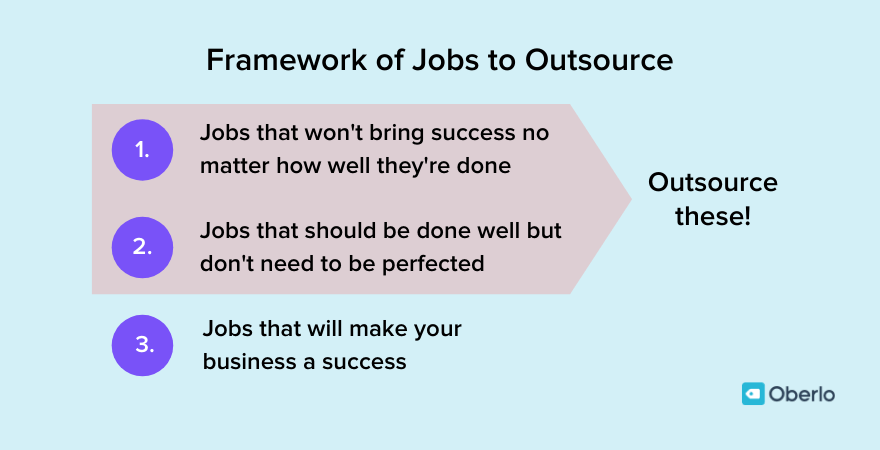
Aleisha: Something that really resonated with me, with what Tomas just said was the value of your time versus being able to outsource it. Often, business owners when you’re just launching, you’re bootstrapping everything, you are trying not to spend too much money, which is perfectly understandable.
But it can get easy to get sucked into the trap of doing everything yourself and spending lots of your own time trying to achieve a task like the example that Tomas gave which was data collection, which is a simple task but can be quite time-consuming and something that is really easily outsourced.
So by outsourcing, you can save yourself time and money and use your precious time to be able to contribute to your business in a way that is really valuable by doing something that you enjoy or a task that you have a really specific skill set that might be hard to outsource in the early days.
Part 5: Jessica Discusses Social Media Outsourcing
Jessica heads up our YouTube channel at oberlo.com. If you haven’t watched some of her videos, they are really fun and thorough and the perfect introduction to starting a business especially if you’re interested in dropshipping.
I asked Jessica what she would recommend when it comes to outsourcing particularly in the area of social media marketing.
Jessica: I recommend that people outsource social media and specifically Instagram if they wanna sell on Instagram. The reason that I recommend that is because one of the keys to success on Instagram is posting quality content but posting it frequently. However, entrepreneurs don’t need to reinvent the wheel and create a whole new kind of post every time they’re posting on Instagram.
So for example, in the past when I’ve had stores and I’ve had a social media presence I would create say three or four templates and this is the work that I would do myself. I would create three to four templates of Instagram posts. Usually, one was a post with an inspirational quote, another was just a pretty stock photo, another would be a product photo.
So I would take that and make templates and then I could go to a freelancer and say, “Okay, I need you to find 15 inspirational quotes about whatever, saving the oceans, for example, or being athletic whatever. And then I need you to give that to me in a spreadsheet.”
And then I would either upload it to Canva, which is one of my favorite tools to use for Instagram posts, or I would give them access to Canva and say, “Now, go in there and make that quote look pretty and put it on Instagram.”
So what’s nice with outsourcing Instagram is that there are a lot of different stages of that content creation process you can outsource.
So if an entrepreneur doesn’t have a lot of money they can just pay for them, the entrepreneur can just pay for the freelancer to find the quotes, for example. And if the entrepreneur has a bigger budget they can say, “Find the quotes, put it in the post, and then post it on Instagram for me.” There’s a lot of flexibility there.
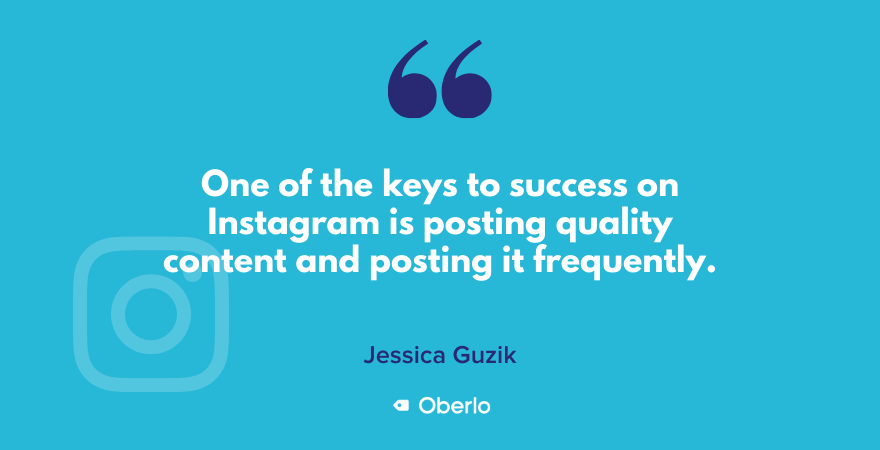
Aleisha: It’s really interesting you mentioned that because we had Ben Waugh on the show a few episodes ago and he is a photographer. And he was saying about being really mindful if you’re doing photo shoots or product photography that you think about Instagram and social media and how you can repurpose content.
And he said, “Don’t be afraid to repeat content. You can repeat posts.” But also think of a different way that you can present an image or change the color or flip it around. There are so many different ways. And no one is really gonna be scrolling through going, “Oh, I saw that image three weeks ago.” It’s not gonna make…
Jessica: No. Oh, yeah, yeah. I often think about my own Instagram behavior and there are accounts that I really love and I love seeing new posts from them. But there are also some accounts that I love seeing repeat posts from them.
I’m actually like, “Oh yeah, I loved that quote or I loved that photo that they took a month ago.” And so I’ll tell my social media freelancers, “Post this quote on Monday and then three Mondays from now.”
And that’s a way that I can increase my frequency of posting while not actually increasing the amount of content that I have produced.
Aleisha: How do we know if someone’s “good at social media” if we’re hiring them off one of these freelancer websites? What do we need to be asking? What proof of good work do we need to see?
Jessica: I like to ask them about their favorite Instagram accounts. I think anyone who’s on these sites is going to have a portfolio, they’ll be able to tell you what they did for other clients.
But I really like someone who is themselves hungry to create cool Instagram content and creative and they wanna bring that to the work.
So when I say what Instagram accounts do you like, I don’t want them to tell me, “Oh, I like Nike because I like Nike apparel.” I want them to tell me, “Oh, I love following Nike because they’re doing this cool thing where they do a series focusing on athletes that are more hardcore and that is inspiring.”
So they’ve thought deeply about that content and I’m thinking, “Alright, I want them to bring those same analytical skills to thinking about my content.” That’s worth paying for.
Aleisha: I love this because as a store owner I think the pressure of having to come up with new content and having to go, “Oh, I haven’t posted on Instagram in two days,” and the Instagram panic that sometimes sits over me, the relief is palpable when you know that someone else is managing it and it’s just something else you don’t have to do.
Jessica: It takes a little bit of time with your freelancer but it’s delightful to be scrolling… I’ll sometimes scroll on my personal account and see a post from my own business account that I didn’t know existed. And I’ll be like, “I love it. This is great.” That’s the beauty of outsourcing right there.
Part 6: Skeezy “Outsourcing” Tactics You Should NEVER Do
Aleisha: So throughout this episode, I have been giving you positive tips. These are definitely things that you can implement now to make big changes to your business and also your time and your life so you don’t feel burned out or overwhelmed. But now, I wanna introduce… This is reintroducing you David ’cause this was your show and I feel like I’ve stolen it from you, David.
David: It’s simpler this way and you get to do the intros now.
Aleisha: Yeah, it’s nice, I like it, David, my lovely co-host, my boss. David, we were talking throughout the week when we were talking about this episode about outsourcing and one of the things that came up was you were talking about how negatively people do outsourcing, and that really piqued my interest.
What do you mean, what are some of the skeezy things that happen and what we don’t want our listeners to do?
David: Yeah, so you’ve had plenty of people on here to talk eloquently about outsourcing and what to outsource and the mechanics of it, and then also, of course, what you need to hang on to as a business owner. And so, I’ll defer to them on all that stuff. They’re smarter than me on all those topics and plenty more.
But yeah, one thing I wanted to bring up was this and skeezy is exactly the right word, kind of this black hat outsourcing that you see all the time, especially in the dropshipping world. And so on paid courses, on YouTube tutorials, everywhere, there’s this idea that you can just kind of like rip off other people’s work and so…
Aleisha: True.
David: It’s outsourcing it with an asterisk. And so, and one example, one really prevalent one is when it comes to ads. And so, when you watch a course, you’ll see them talk about setting up Facebook ads. This is normal. We have a dropshipping course where we talk about Facebook ads and so there’s nothing unusual about setting up Facebook ads. And then if you’re gonna do that, you might as well do video ads, ’cause videos move the needle much better than photos.
And so, I think the idea that you need a Facebook presence and that that presence needs to have a video component, like all well and good there. But then where things get a little bit dodgy is where these experts, these gurus, when they talk about getting your videos, they say that you should just rip off videos from other stores and other businesses.
And this is like, it’s kind of inherently cringey that you’re gonna just steal work from other people, but it’s also just kind of stupid for a few reasons.
So yeah, there’s definitely the gross side of it, where it’s just like what’s going on here, why are we this lazy or why are we this… I don’t wanna sound haughty but immoral or whatever the word is. So there’s that part of it, but then there’s also…
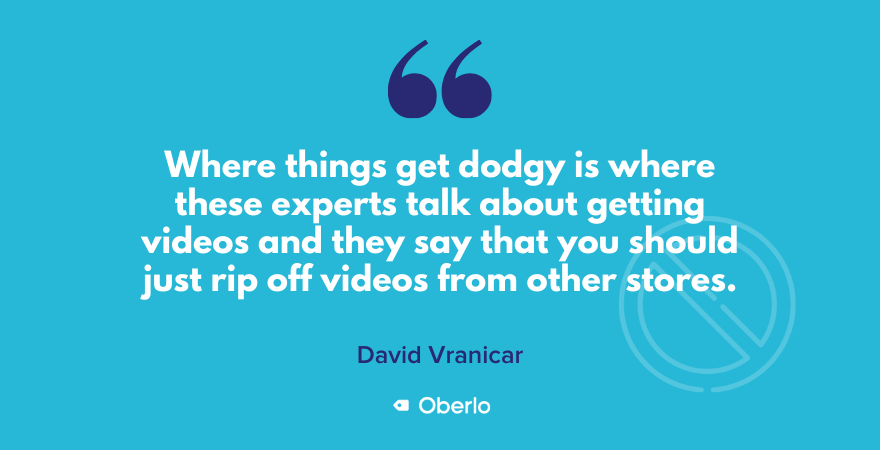
Aleisha: I’m gonna say, I’ll say, David, I think it is immoral. I think it’s like what sort of pride are you taking to your business when you’re like, “No, let’s just rip off someone else’s stuff.” Actually, we’ve got a little excerpt. Let’s listen, this is some of the stuff that we’ve found online.
Anonymous speakers: “This is what dropshipping is really all about. This is gonna happen to you, especially if you find a successful product, people are just gonna copy, people are just gonna steal. Yeah, so actually, this is a perfect video. There are absolutely no logos on it, there’s nothing, so you can just use this straight up as your own.”
“Now the next thing is, you only wanna try and use videos where it has no text on it or no symbols, you kinda wanna try and pick content that has nothing on it, you can find content and it’s good content, but it has words on it, just make sure, that you’re gonna be able to write over their words so you can basically like kind of move their words out of the way and replace them with your own wording.”
“So, go Google, ‘Facebook video downloader’ and then you’re gonna get this program, so then you’re gonna take that URL from the top, and you’re gonna click download.”
Aleisha: Okay, so that’s not cool. Like, I listen to that and I watch the videos, and I’m like, “Dude, you’re basically just saying you don’t have enough pride in your own stuff to make your own content, just rip someone else’s, it’s fine, you can cover it up.” Oh, I scream, I was so annoyed.
David: Yeah, well, and then, so there’s that part of it, but then it’s also just inviting problems because if you find a video that’s done well enough where you wanna replicate it or just straight up steal it, that’s probably a business that knows what they’re doing and they’re probably gonna have their eye out for anything in their sphere that they wanna be aware of and so they’re gonna just complain to Facebook and it’s gonna get taken down and your ad’s gonna disappear.
And what’s interesting in the clip you just played, there’s another part of that segment where the guy’s talking about how to set up these, kind of, ripped off Facebook video ads. And during this bit, he navigates to one of his other store pages and while he’s doing it, he realizes that that store page has been taken down by Facebook and it’s just like…
And I was kind of surprised that this was left in the course, but, so while he’s talking about this blatant infringement on another business’s work, he says, “Oh wow, Facebook killed my other page, but anyway, I’ll show you how to rip off this video.” And so it’s… I don’t know, I don’t know what else you need to know, but yeah.
Facebook’s not gonna put up with that. It’s spelled out really clearly in Facebook’s advertising policy. It’s like this is not kosher as far as they’re concerned.
And you know, it’s interesting that there’s this sense that with dropshipping or with an ecommerce store that you throw up overnight, that it’s okay to just burn really hot and fast and do a bunch of sketchy stuff because it’s gonna be temporary anyway, and so you don’t need to implement all these best practices because let’s just, let’s burn, burn, burn and then the store is gonna be done anyway.
This becomes a self-fulfilling prophecy where if you think your store’s gonna be short-lived and you do all of this sketchy stuff and then it turns out that Facebook nails you and your ads disappear and then your page gets taken down, you might say, “Oh yeah, well, I made the right move because, in the end, my store got taken down.”
But your store’s been taking down because of the stupid stuff that you did at the beginning.
And so, this idea that it’s okay to do this stuff if you’re not making your own products or if you have, if you’re using a certain fulfillment method, it’s just, like you said, it’s gross.
Aleisha: It’s like a perpetual cycle of skeeze that just goes round and round.
David: Skeeze to the infinite power. Yeah, well, I guess a part of that, the thing is it’s so easy to do I guess, there are extensions and there’s… I mean and in one of those courses that we were looking at this week, the guy just dropped a URL into a website and then that website just rips the video and downloads it. So the mechanics of doing it are unfortunately pervasive and in place and so it’s there for the taking.
But I guess the second part of why this is kind of dumb in addition to just kind of inviting problems when it comes to complaints and when it comes to Facebook nailing you, it’s not that hard to create good video content and so there are all these tips that we’ve gone over in this episode about outsourcing, there are blog posts including over at the Oberlo blog where you can read all about how to create video ads.
We have example ads that we did on the fly and the barrier to acceptable video content, like right now, I think is really reassuringly low.
What is TikTok besides quick, kind of unprofessional videos that people love? Like the idea that you need to have some sort of Hollywood background to create a cool video ad, it’s not the case.
And we had somebody on the podcast a few weeks ago, Ezra Firestone, he was talking about how he has a Facebook ad campaign that he’s running at 22,000 bucks a day. So a big five-figure ad campaign that he, that it’s underpinned by an iPhone video that they threw together.
And so, videos aren’t so mystifying that you need to even be stealing them. It’s something that whatever computer you have, it’ll have some sort of software on it, there’s free stuff to download, if you have a phone, there’s your video camera.
The skeeze factor or the gross factor, that’s all real, but then on the more practical side, don’t mess with sussing out somebody else’s video when you could just do your own creative thing.
Aleisha: There we go. So this has been a really positive experience, David, we’ve had lots of really good tips from the Oberlo and Shopify team and also past guests and I’m glad that you raised this and I hope that we’ve inspired people to go out and make their own content.
But also, avoid the burnout and feel like they are actually being able to manage their time and do tasks and activities that they actually enjoy, and then just pass the rest of it off to people that wanna make a bit of money, especially during COVID. I think this is a really good time to hire freelancers who maybe really need the work as well.
David: Yeah, and we’ve had digital nomads on the podcast, they’ve talked about how they’re more than eager to land the next client or the next few clients, so I think it’s a very good time to find people who are ready and more than capable. There’s so much talent out there, there’s no reason to need to resort to anything dodgy. There are talents out there who are ready to roll.
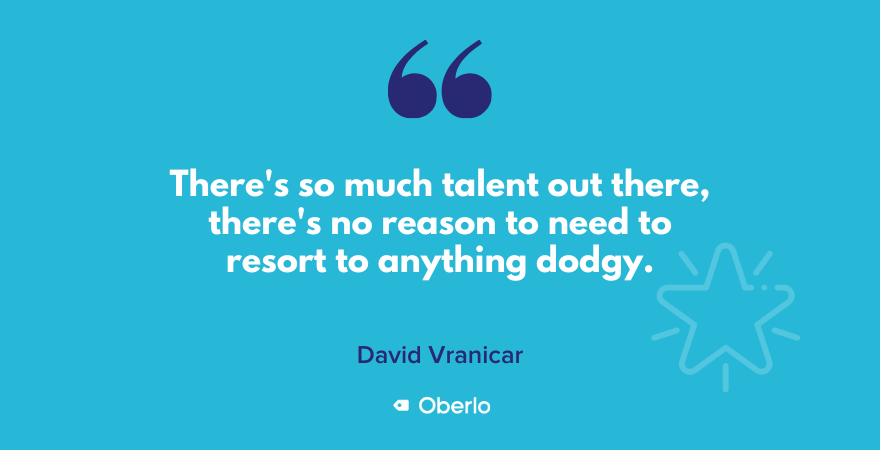
Aleisha: And just avoid doing what I did and talked about earlier, in the episode where I thought, “Hey, I’ll just teach myself HTML,” and then it took me 27 hours when I could’ve just hired a Shopify guru and it would have been done in 10. We don’t have to be martyrs, we can just make some money.
David: Yeah, and your customer won’t know about the 27 hours.
Aleisha: Yeah, no, they will not know the frustration, the coffees. It’s just not necessary, that’s not necessary at all. If you would like more information about what we do, all you need to do is visit Oberlo.com, there are so many different resources available. And David, you’ll be back hosting the show sometime soon, I haven’t stolen it away from you completely.
David: We’ll have you on as a guest when I do that.
Aleisha: Yeah, I like that, thank you. You can return the favor. Be sure to subscribe and like and leave us a review, if that takes your fancy. Until next week. Thanks a bunch, David.
David: Thank you.



Want to Learn More?